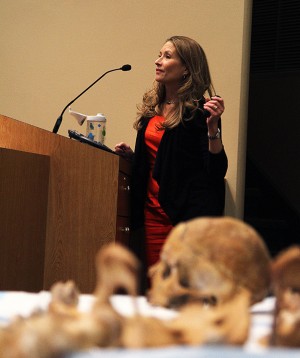

Travis Taylor | Lariat Photographer
Reporter
Dr. Lori Baker, assistant professor of anthropology at Baylor, identifies remains of undocumented immigrants crossing the border and reunites them with their families as director of the Reuniting Families program.
At a lecture in Cashion Wednesday evening, Baker talked about the program and the work that they have accomplished.
As director of the project, Baker, has worked in identifying remains mainly on the border between Mexico and the United States.
Baker joined the faculty at Baylor in 2002 with the goal of making a database of newly identified bodies that was accessible to families, law enforcement and medical examiners.
The database provides a centralized place for all of Baker’s DNA analysis, allowing private citizens search for characteristics that might match those of their missing relatives.
With the U.S.-Mexican border being about 2,000 miles long, it makes it almost impossible for border patrol agents to monitor every stretch of land.
Most of the immigrants trying to cross the border do so without carrying proper documentation in order to prevent being identified if caught.
Since they do not have many items to help with identification, Baker and her team rely on anthropology and bone analysis to figure out details of the person and their life such as broken bones, gender and even where they originated.
Once the remains are acquired, it can still be difficult to discern whom they belong to.
“We only get the bones that can be found by the individuals doing the search, and they don’t always know what to look for,” Baker said, “There are very sparse elements that come to us. There’s always a lot of scatter and of course there are lots of wild animals. So there’s a lot of havoc wreaked with these remains.”
Baker has created a depository on campus to store the bones left unidentified. The cases are open.
Last summer, Baker took a group of students on a field school to Del Rio to work with her as she unearthed new graves.
Schertz senior Valerie Alvarez was a member of the group that found the remains of a woman, which were on display at the lecture.
“The hardest thing is finding the unexpected,” Alvarez said. “So finding her body not facing the correct direction and discombobulated. That was really hard. Also, finding the child, that’s very sad. These were all bodies found dead on the border, so to know that somebody was bringing their child with them and they didn’t make it was sad.”
Baker has been able to help give some families closure and a chance to mourn.
“What has been universal over the last 10 years, what we know, is that every mother that we speak to tells us now I have place to go and pray,” she said “They feel lost before that happens, so when we’ve been able to get in I.D., we have not heard anything from mothers except thank you and now I have a place to go and pray.”
Baker is assembling another team to take to Falfurrias this summer. Students interested in the program can contact the department of anthropology at 254-710-4084





